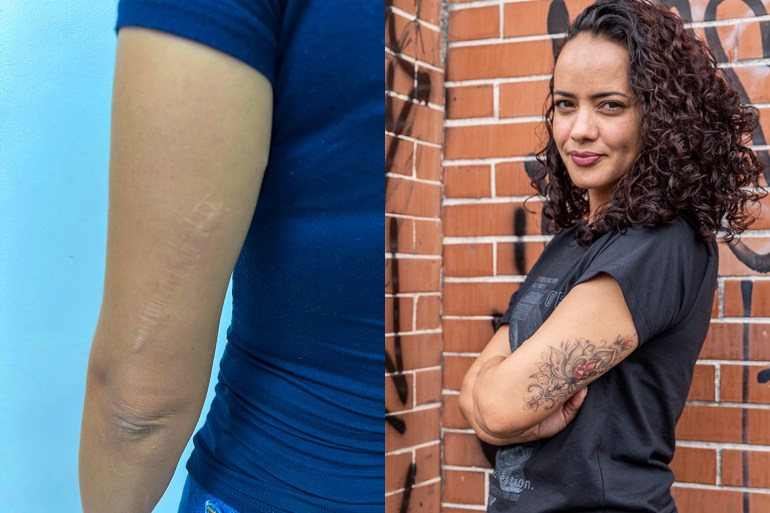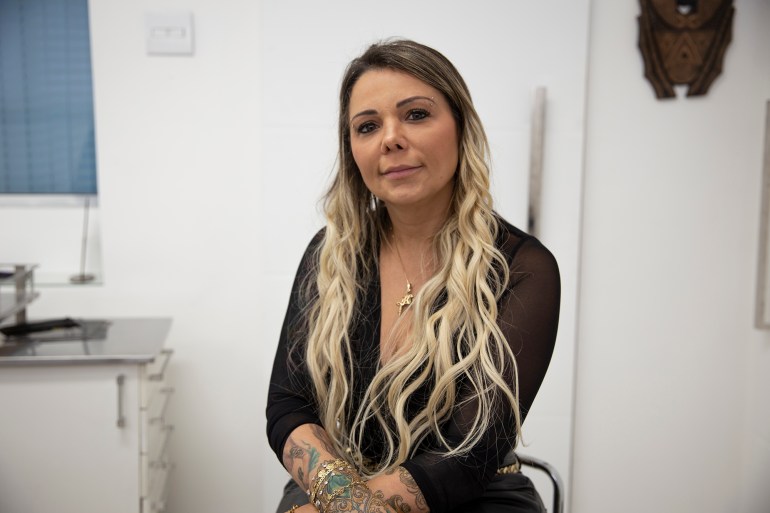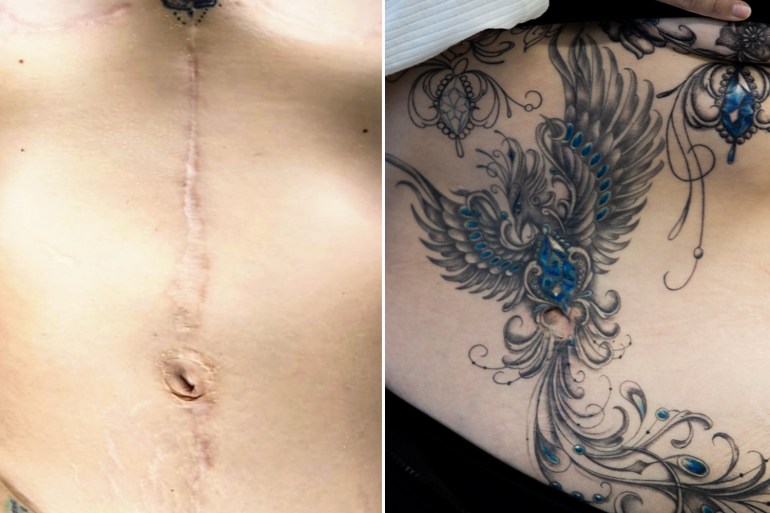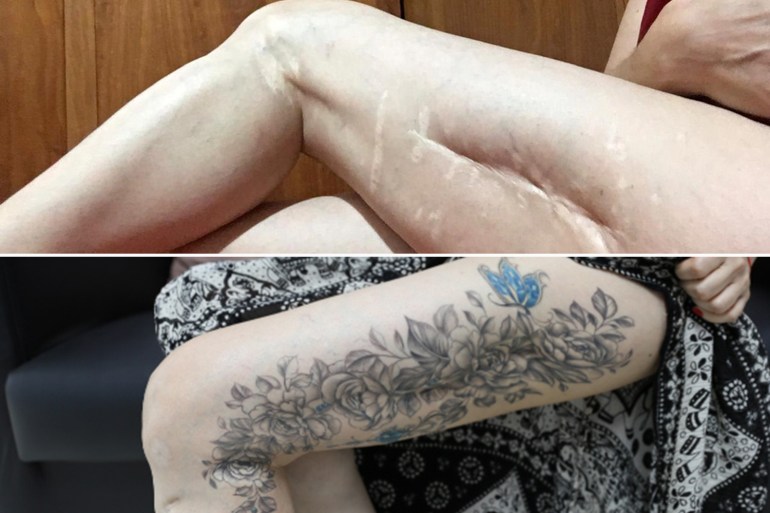How tattoos are helping overcome trauma, domestic abuse in Brazil | Women News
Sao Paulo, Brazil – Talita Souza walked through the doors of Stylo Tattoo in Sao Paulo hoping to cover up the scars on her forearms – the result of domestic abuse.
Souza, a mother of two, calls the abuse incidents, where her partner assaulted her, pulled her hair, hanged her and kicked her over a period of four years, “accidents”.
“When we talk about domestic violence, there is a lot of stigma, they always try to blame the woman,” Souza told Al Jazeera. “They don’t think there are people who can hurt other people.
“Because he pushed me [in 2017, the time of the latest incident], it was considered a fight. I was pushed out of the door. I tried going back in and he closed the door on me. The glass shattered and I ended up with 66 stitches and these scars.
“So it was termed an accident, a domestic accident.”

Souza heard about the “We Are Diamonds” tattoo project through another Facebook page where help and advice was shared for victims of domestic abuse and decided she needed to cover up the scars to partially move on with her life.
The project was launched by former law student Karlla Mendes in 2017.
Mendes started designing tattoos after she realised she “loved being able to leave art on someone’s body forever”.
“In 2016, I went through a difficult period in my life, when I was kind of depressed and looking for something that would give more meaning to my career. And I think I found that through this project.”
Since the launch of the project, Mendes has served about 160 people. She still remembers her first: A domestic helper for one of her clients who had saved three months of salary to be able to get a tattoo and cover up a scar on her arm.
“When I was drawing her tattoo, she looked at herself in the mirror and started to cry,” Mendes told Al Jazeera at her studio.
“And there I saw that my work could change people’s lives. That’s when I created this project. I told her she didn’t have to pay and she could go buy a new blouse or a bikini to enjoy her new life and send me some pictures.”
While Mendes has found a sponsor for the equipment she uses for this project, the 40-year-old sets aside two days a week to help women move on from their emotional past.

“I receive victims of domestic violence, breast cancer, people who were run over, unsuccessful surgeries and so on.
Sitting nearby and nodding her head in acknowledgment was 35-year-old Helloany Araquam Trufelli who underwent treatment to reverse an early menopause nine years ago.
The hormone therapy went on for two years and she said she gained 40kg (88 pounds).
“It bothered me a lot because everyone asked why I was obese,” she told Al Jazeera.
“I reached 100kg (220 pounds), got high blood pressure, diabetes, anemia, spinal disc herniation and had to undergo psychological treatment to accept everything that happened in my life in those two years.
“My emotional state was very shaken because I didn’t accept it. It didn’t affect my relationship but it did affect me because I didn’t feel good about being with my husband. I didn’t see myself having an athletic husband and being obese.
“Society has prejudice, but I was more prejudiced against myself, because I didn’t accept myself for being that size.”
After Helloany underwent a procedure to reduce her weight, she was left with scars from her chest down to the left upper thigh.
She couldn’t find a cosmetic procedure that would soften them and while doing he research, she came across Mendes’s project and decided to send in an application telling her story.

Mendes does not charge for the tattoos, the biggest of which would cost more than $2,000.
“I wanted to create something that had more of my soul in the drawing, and not just make normal tattoos,” she said. “Jewelry and the empowerment of jewelry. Every woman likes and feels good with jewelry, so I decided to associate it with tattooing.”
But while the tattoos help in covering up the physical scars, Helloany’s husband urged society to focus on more demanding issues in life.
“I think there is an exaggerated demand for body worship. We need to teach people to eat better, to show how important physical activity is in everyone’s life,” 37-year-old William Trufelli, a physical education teacher like his wife, told Al Jazeera.
“We need to create a mechanism so that everyone has the possibility to move around, to do a physical activity. And that prejudice needs to diminish. Just because a person is fat doesn’t mean they can’t be cool or successful in life.”

Cosmetic surgery gone wrong
Under the needle across the room from Helloany and her husband was former model Nagila Sales, 27, who underwent an aesthetic procedure more than two years ago to “fill the buttocks” despite admitting her body was “perfect” and she was “happy with life”.
“I was looking on Instagram and a friend of mine had the filler done and I thought it was really cute,” Sales said. “I already had a nice body but we sometimes want to do things… and it doesn’t always work out.”
Admitting attending a clandestine clinic for the procedure was a “major mistake”, Sales realised things were going wrong when the wounds started opening and the filler would ooze out. She was left with scars and unable to continue her work as a model.
While spending 10 hours at the tattoo studio would resurrect Sales’s career, Souza, the victim of domestic violence, said the emotional scars would remain with her forever.
“The scar always reminded me that I almost died in front of my daughters,” she said, recalling the incidents and breaking down.
“That’s perhaps worse than physical violence. This one left marks, the other aggressions did not leave marks, but the psychological one remains. While doing my research, I read something that another victim wrote and I quite agree with it: ‘I wish there were tattoos for the soul’.”

Pingback: where to buy dmt vape
Pingback: testing Automation platforms
Pingback: Malabar Mushroom Strain
Pingback: Kardinal Stick
Pingback: ketamine powder
Pingback: ข่าวบอล
Pingback: Order moonrock online usa,
Pingback: pg slot เว็บตรง
Pingback: Herbalife products
Pingback: cams
Pingback: altogel
Pingback: 안전 사설 토토 사이트 추천
Pingback: https://www.horizonsunlimited.com/hubb/communications/data-and-phone-sth-america-97634
Pingback: นิยาย
Pingback: best gym equipment shop USA
Pingback: freshbet